- Home
- Martin Cruz Smith
Gorky Park Page 2
Gorky Park Read online
Page 2
‘Comrade General, Chief Investigator Renko reporting,’ Arkady said, according to ritual. Had he shaved? he asked himself. He resisted the temptation to run his hand over his chin.
The general gave the faintest of nods. A colonel said, ‘The general knows you are a specialist in homicides. He believes in specialization and modernization.’
‘The general wants to know your initial reaction to this matter,’ the other colonel said. ‘What are the chances of an early resolution?’
‘With the world’s finest militia and the support of the people, I feel confident we will succeed in identifying and apprehending the guilty parties,’ Arkady answered forcefully.
‘Then why,’ the first colonel asked, ‘has there not even been a bulletin to all precincts for information about the victims?’
‘The bodies had no papers, and being frozen, it’s difficult to say when they died. Also there was some mutilation. There will be no identification of the usual order.’
After a glance at the general, the other colonel asked, ‘There was a representative of State Security at the scene?’
‘Yes.’
The general finally spoke: ‘In Gorky Park. That I don’t understand.’
In the commissary, Arkady breakfasted on a sweet roll and coffee, then fed a two-kopek piece into a public phone and called. ‘Is Comrade Teacher Renko there?’
‘Comrade Renko is occupied in a conference with a committee from the district party.’
‘We were going to have lunch. Tell Comrade Renko . . . tell her that her husband will see her tonight.’
For the next hour, he pulled the records on young Detective Fet, satisfying himself that the man had only worked on cases of special interest to the KGB. Arkady left headquarters through the courtyard fronting on Petrovka Street. Militia clerks and women returning from long shopping breaks picked their way around the limousines that filled the circular driveway. He waved at the guard box and walked to the forensic labs.
At the autopsy-room door Arkady stopped to light a cigarette.
‘You going to puke?’ Levin looked up when he heard the match strike.
‘Not if it will interfere with your work. Keep in mind, I’m not getting extra like some people.’ Arkady was reminding Levin that pathologists were paid 25 percent more than ordinary doctors who worked on the living. It was ‘hazard pay’ because nothing was so dangerously alive with toxic flora as a corpse.
‘There’s always a chance of infection,’ Levin said. ‘Just one slip of a knife—’
‘They’re frozen. The only thing they can give you is a cold. Besides, you never slip. For you, death’s just a bonus.’ Arkady inhaled until his nose and lungs were thoroughly corrupted with smoke.
Ready, he entered an atmosphere of formaldehyde. The three victims may have been wildly dissimilar as personalities; as cadavers they were uniquely three of a kind. Albino-white, just a tinge of lividity around the buttocks and shoulders, skin raised in fat goose bumps, a hole above each heart, fingers without tips and heads without faces. From scalp line to chin, and from ear to ear, all flesh was cut and removed, leaving masks of bone and black blood. The eyes had also been dug out. That was how they had come out of the snow. Levin’s assistant, an Uzbek with a runny nose, was adding new embellishments, cutting into the chest cavities with a rotary saw. The Uzbek kept putting the saw down to warm his hands. A good-sized body could stay like ice for a week.
‘How do you solve murders if you can’t stand the sight of dead people?’ Levin asked Arkady.
‘I arrest live people.’
‘That’s something to be proud of?’
Arkady collected the preliminary charts from the tables and read:
Male. Europoid. Hair brown. Eyes unknown. Age app. 20–25. Time of death from 2 wks. to 6 mos. Frozen before any significant decomposition could occur. Cause of death, gunshot wounds. Soft facial tissue and third phalanges of both hands missing due to mutilation. 2 possible fatal wounds. Wound ‘A’ fired at contact at mouth fracturing from upper jaw, bullet traveling at 45 degrees through brain and exiting high in posterior of skull. Wound ‘B’ fired 2 cms. left of sternum into heart, rupturing aorta. Bullet marked GP1–B recovered loose in chest cavity.
Male. Europoid. Hair brown. Eyes unknown. Age app. 20–30. Time of death app. 2 wks. to 6 mos. Soft facial tissue and third phalanges lost to mutilation. 2 possible fatal wounds. Wound ‘A’ fired at contact at mouth, fracturing upper jaw and breaking off incisors, bullet traveling at diverted angle through brain scoring inside posterior of skull starting 5 cms. above meningeal groove. Bullet marked GP2–A recovered loose in skull cavity. [GP2–A was the slug Pribluda had dug out.] Second wound 3 cms. left of sternum through heart region. Bullet marked GP2–B recovered from inside left shoulder blade.
Female. Europ oid. Hair brown. Eyes unknown. Age app. 20–23. Time of death app. 2 wks. to 6 mos. Cause of death gunshot wound 3 cms. left of sternum into heart, rupturing right ventricle and superior vena cava, exiting from back between third and fourth ribs 2 cms. left of spine. Heads and hands mutilated as males GP1 and GP2. Bullet marked GP3 found inside dress behind exit wound. No signs of pregnancy.
Arkady leaned against a wall, smoking until he was almost dizzy, concentrating on the papers in his hands.
‘How did you get the ages?’ he asked.
‘Lack of wear on the teeth.’
‘Then you’ve done a dental chart.’
‘Done, but it won’t help much. One steel boiler-plate molar in the second male.’ Levin shrugged.
The Uzbek handed over odontology charts, along with a box of broken incisors notated as the bullets had been.
‘One’s missing,’ Arkady counted the teeth.
‘Pulverized. What’s left is in another container. But there are some items of real interest that are not on the preliminary report, if you’d care to have a look.’
Clam-gray cement walls, stains around the floor drains, aching fluorescent lights, white flesh and pubic ruffs came into focus. The investigator’s trick was to see and not see, but – Three dead people. Look at us, the masks said. Who killed us?
‘As you see,’ Levin said, ‘the first male shows a heavy bone structure with well-developed musculature. The second male shows a slight physique and an old compound fracture of the left shin. Most interesting.’ Levin produced a feathery tuft between his fingers. ‘The second male dyed his hair. Its natural color is red. It will all be in the complete report.’
‘That I’ll look forward to.’ Arkady left.
Levin caught up at the elevator and slipped into the car with Arkady. He had been a chief surgeon in Moscow until Stalin shook Jewish doctors out of the trees. He held his emotions like gold in a fist; a sympathetic expression on him was out of place, a tic.
‘There must be another investigator to handle this,’ he told Arkady. ‘Anyone else. Whoever cut those faces and hands knew what he was doing. He’d done it before. This is the Kliazma River all over again.’
‘If you’re right, the major will take over the case by tomorrow. They won’t let it get so far this time, that’s all. Why are you so worried?’
‘Why aren’t you?’ Levin opened the doors. Before they shut, he repeated, ‘The Kliazma River all over again.’
Ballistics was a room with most of its space occupied by a four-meter-long water tank. Arkady left the bullets and went on to the Central Forensic Laboratory, a hall room of parquet floors, marble-topped tables, green chalkboards and knee-high ashtrays embraced by lead nymphs. Separate tables were set aside for each victim’s clothes, and different teams worked over the damp remains. In charge was a militia colonel with slick hair and plump hands called Lyudin.
‘Not much but blood so far.’ Lyudin beamed.
Other technicians looked up at the investigator’s arrival. One of Lyudin’s men was vacuuming pockets; another brushed crust from ice skates. Behind them was a pharmacopoeia colorful as candy in glass jars – reagents, iodine crystals, silver nitrate so
lutions, agar gels.
‘What about the origin of the clothes?’ Arkady asked. He wanted to see good-quality foreign merchandise, signs that the dead trio were criminals involved in the kind of black-market smuggling the KGB has to investigate.
‘Look.’ Lyudin directed Arkady’s attention to a label inside one of the jackets. The word on the label was ‘jeans’. ‘Domestic thread. All of it junk, what you could buy in any store here. Look at the bra.’ He gestured to another table. ‘Not French, not even German.’
Lyudin, Arkady saw, wore a wide, hand-painted tie inside his open lab smock. He noticed it because wide ties were not available to the general public. The colonel was pleased with Arkady’s frustration over the victim’s clothes; forensic technicians became important in direct ratio to an investigator’s frustration.
‘Of course, we have yet to employ the gas chromatograph, spectrometer, neutron-activation sampling, but that kind of testing is very expensive for three separate sets of clothing.’ Lyudin raised his hands helplessly. ‘Not to mention the computer time.’
A big production, Arkady reminded himself. ‘Colonel, there is no budget on justice,’ he said.
‘True, true, but if I could have something signed, authorization to conduct a full gamut of tests, you see.’
Arkady ended up signing a blank authorization. Colonel Lyudin would fill it with unnecessary tests he wouldn’t conduct and then sell the unused chemicals privately. He was an expert technician, though. Arkady had no right to complain.
The technician in the ballistics room was shuttling bullets through a comparison microscope when Arkady returned.
‘See?’
Arkady leaned over. One slug from Gorky Park was under the left eyepiece, a second under the right, the two fields of vision abutting. One slug was heavily damaged from its transit through bone, but both had the same left-hand rifling, and as Arkady rotated them he picked out a dozen points of similarity in lands and grooves.
‘The same gun.’
‘All the same gun,’ the technician agreed. ‘All five. The 7.65 caliber is strange to me.’
Arkady had brought only four slugs from Levin. He removed the two slugs from the microscope. The one in his right hand was unlabeled.
‘Just came in from the park,’ the technician said. ‘Metal detectors found it.’
Three people killed in an open area at close range from the front with a single gun. Shot and then cut open.
Pribluda. The Kliazma River.
The Moscow town prosecutor’s office was south of the river on Novokuznetskaya Street in a section of nineteenth-century shops. The office building itself was divided down the middle into a yellow two-story side and a gray three-story side. The investigators in the yellow half looked out onto a sad and tiny park where citizens called for interrogation could sit and despair. In the park were a flower bed the size of a grave and empty flower urns on swivel bases. From the other side of the building, the larger side, the prosecutor looked down on a playground.
Arkady entered the investigators’ door and took the stairs two at a time to the second floor. Chief Investigators Chuchin (Special Cases) and Belov (Industry) were in the hall.
‘Iamskoy wants to see you,’ Chuchin warned.
Arkady ignored him and went on to his office at the back. Belov followed. Belov was the oldest investigator and owned what he called ‘an indefatigable affection’ for Arkady. The office was three meters by four, brown walls around pine furniture and one double-cased window, embellished by street and transport maps and an unusual photograph of Lenin in a lawn chair.
‘You’re hard on Chuchin,’ Belov said.
‘He’s a pig.’
‘He does necessary work.’ Belov scratched a balding crew cut. ‘We all specialize.’
‘I never said pigs weren’t necessary.’
‘My very point. He deals with social garbage.’
Vsevolod Belov of infinite baggy suits. A mind scored by the Great Patriotic War like a wall once raked by machine-gun fire. Fingers webbed with age. Greathearted and an instinctive reactionary. When Belov muttered about ‘Chinese bandits’, Arkady knew there was a mobilization at the border. When Belov mentioned ‘kikes’, synagogues were shut. When in doubt on any social issue, he could go to Belov.
‘Uncle Seva, who dyes his hair and wears a sports jacket with a false foreign label?’
‘Bad luck,’ Belov commiserated. ‘That sounds like musicians or hooligans. Punk rock. Jazz. That sort. You won’t get any cooperation from them.’
‘Amazing. Hooligans, then, is your opinion.’
‘You’d know better than I with your intelligence. But, yes, such a masquerade as dyeing the hair and the false label indicates hooligans or someone with strong musical or hooliganistic tendencies.’
‘Three of them shot with the same gun. Sliced up with a knife: no papers. With Pribluda first to sniff over the bodies. Does that remind you of anything?’
Belov pulled his chin in and his face wrinkled like a fan.
‘Personal differences between the organs of justice should not interfere with the greater work,’ he said.
‘You remember?’
‘I think’ – Belov’s voice strayed – ‘that with hooligans there was probably a gang war involved.’
‘What gang wars? Do you know of any such gang wars in Moscow? Siberia or Armenia, perhaps, but here?’
‘I know,’ Belov insisted, ‘that an investigator who avoids speculation and keeps his eyes on the facts is never misled.’
Arkady let his hands fall flat on his desk and smiled. ‘Thank you, Uncle. You know I always value your opinion.’
‘That’s better.’ Relief carried Belov to the door. ‘Have you spoken to your father lately?’
‘No.’ Arkady spread the preliminary autopsy reports over his desk and pulled his typewriter stand close.
‘Give him my regards when you do. Don’t forget.’
‘I won’t.’
Alone, Arkady typed his preliminary investigation report:
Moscow Town Prosecutor’s Office, Moscow, RSFSR.
Crime – Homicide. Victims – 2 Unidentified Men, 1 Unidentified Woman. Location – Gorky Cultural and Recreational Park, Octobryskaya region. Reporting Party – Militia.
At 0630, a militiaman making his rounds of the southwest corner of Gorky Park found what appeared to be three bodies in a clearing app. 40 meters north of the footpath on a line with Donskoy Street and the river. At 0730, militia officers, officers of State Security and this investigator examined three frozen bodies.
Because of their frozen state it is possible now only to state that the victims were killed sometime this winter. All three were shot through the heart. The two men were also shot through the head.
5 bullets recovered all came from the same 7.65mm. weapon. No cartridges were recovered.
All the victims wore ice skates. No papers, change or other items were found in their clothes. Identification will be hampered by mutilation that removed the flesh of the face and fingertips. Reports – serology, odontology, ballistics, chromatography, autopsy and further on-site examination – are forthcoming, and a search of persons with possible knowledge of victims or the park site has begun.
It may be assumed to be a premeditated crime. Three people were killed quickly by a single weapon, all personal effects removed in the middle of the city’s most crowded park, extreme measures carried out to hinder physical identification.
Note: One of the dead men dyed his hair and another wore a jacket with a false foreign label, possible indications of antisocial activity.
Renko, A. V.
Chief Investigator
While Arkady read this flimsy familiarization report through, Detectives Pavlovich and Fet knocked and entered, Pasha carrying a briefcase.
‘I’ll be back in a minute.’ Arkady put his jacket back on. ‘You know what to do, Pasha.’
Arkady had to go down to the street to enter the prosecutor’s side of the building. A p
rosecutor was a figure of unusual authority. He oversaw all criminal investigations, representing both state and defendant. Arrests had to meet the prosecutor’s approval, court sentences came under his review and appeals came from his initiation. A prosecutor entered civil suits at his pleasure, determined the legality of local-government directives and, at the same time, decided the million-ruble suits and countersuits when one factory delivered nuts rather than bolts to another factory. No matter how great or small the case, criminals, judges, mayors and industrial managers all answered to him. He answered only to the prosecutor general.
Prosecutor Andrei Iamskoy was at his desk. His skull was shaved pink, a startling contrast to his uniform, dark blue with a general’s gold star, especially tailored for his oversized chest and arms. Flesh had accumulated over the bridge of his nose and cheekbones, and his lips were thick and chalky.
‘Wait.’ He went on reading a paper on his desk.
Arkady stood on a green carpet three meters from the desk. On the paneled walls were photographs of Iamskoy heading a delegation of prosecutors at a ceremonial meeting with General Secretary Brezhnev, shaking hands with the General Secretary, speaking to an international conference of prosecutors in Paris, swimming at Silver Grove, and – absolutely unique – the remarkable Pravda portrait of him arguing an appeal before the Collegium of the Supreme Court for a worker wrongly convicted of murder. Behind the live prosecutor was a window guarded by maroon curtains of Italian velvet. Large brown freckles mottled Iamskoy’s shining cranium, though sunlight was already fading, tucked behind the curtains.

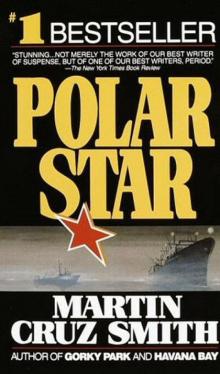 Polar Star
Polar Star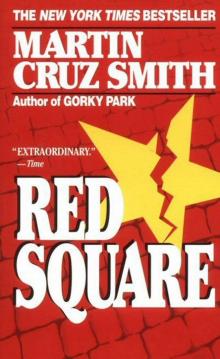 Red Square
Red Square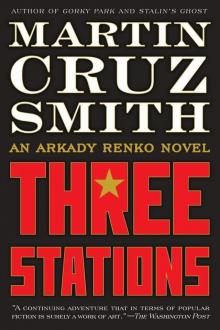 Three Stations
Three Stations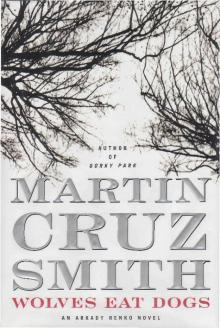 Wolves Eat Dogs
Wolves Eat Dogs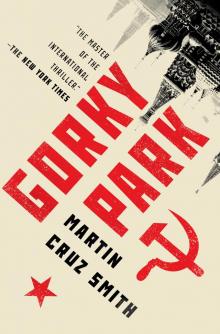 Gorky Park
Gorky Park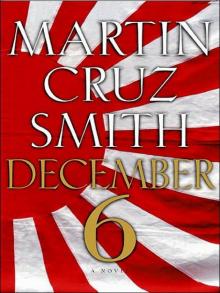 December 6
December 6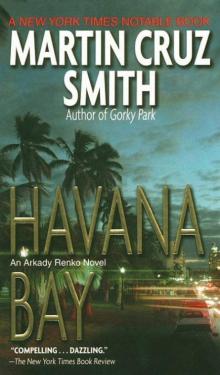 Havana Bay
Havana Bay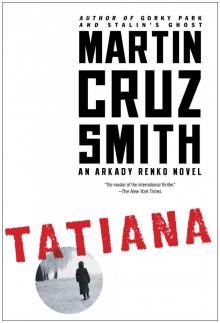 Tatiana
Tatiana The Girl From Venice
The Girl From Venice Stalin's Ghost
Stalin's Ghost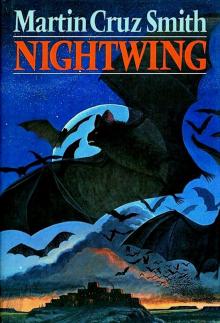 Nightwing
Nightwing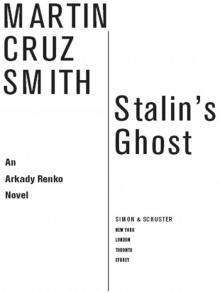 Stalin s Ghost
Stalin s Ghost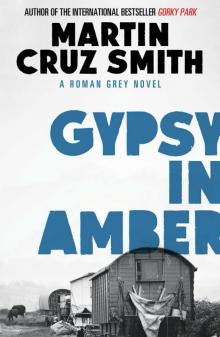 Gypsy in Amber
Gypsy in Amber Rose
Rose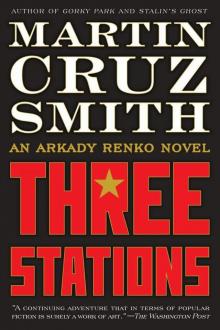 Three Stations: An Arkady Renko Novel
Three Stations: An Arkady Renko Novel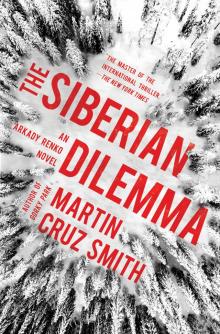 The Siberian Dilemma
The Siberian Dilemma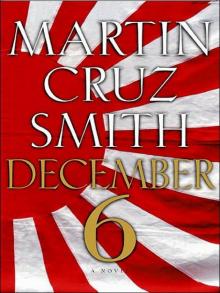 December 6 (V5.0)
December 6 (V5.0)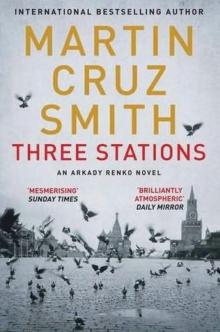 Three Stations ar-7
Three Stations ar-7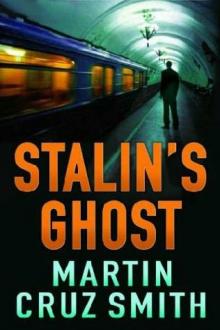 Stalin’s Ghost ar-6
Stalin’s Ghost ar-6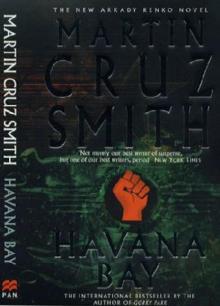 Havana Bay ar-4
Havana Bay ar-4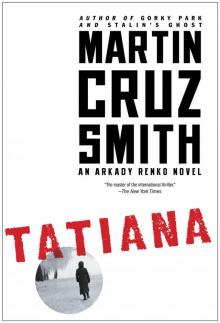 Tatiana ar-8
Tatiana ar-8